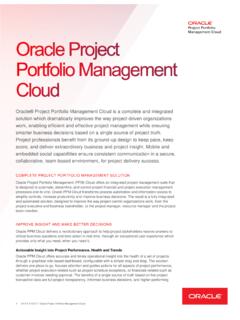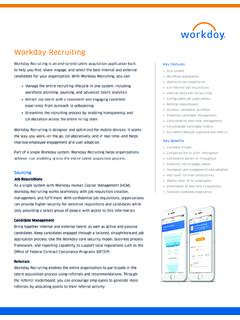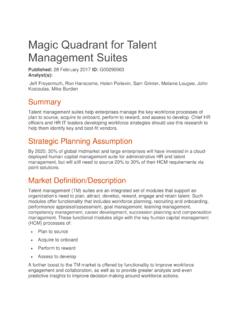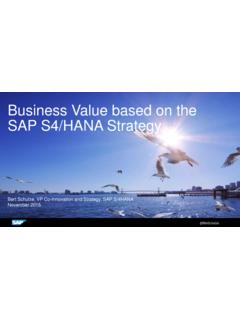Transcription of The impact of artificial intelligence within the ...
1 The impact of artificial intelligence within the recruitment industry: Defining a new way of recruiting Authors James Wright Pearson Business School, London United Kingdom Dr David Atkinson Keele management School, Keele University, United Kingdom The impact of artificial intelligence within the recruitment industry: Defining a new way of recruiting Authors James Wright Pearson Business School, London United Kingdom Dr David Atkinson Keele management School, Keele University United Kingdom Abstract This paper set out to consider artificial intelligence (AI) and the impact its growing influence is having within the recruitment industry. This research considered how AI is influencing employers and candidates, specifically throughout the initial stages of the recruitment process. With limited academic research conducted to date, AI has been accepted, by practising recruitment specialists, as being game-changing for HR (May, 2016, ).
2 The overarching aim of this research was to make recommendations on how recruitment processes could be changed, for the better, in recognition of the introduction of AI technology. Technology has always held an influence within the recruitment scene, reducing costs and delivering increased effectiveness in recruiting candidates (Okolie, 2017, Singh, 2003). However, the US Department of Labor suggested recruitment, as it stands, is only 16% effective (ClearFit, ). If this is the case, the introduction of AI provides the opportunity to achieve significant improvements. According to Bullhorn (2018), these early improvements are likely to effect the sourcing and screening of candidates, the initial stages of the recruitment process. Due to the lack of academic literature regarding AI s influence on the recruitment industry, an integrative literature review was conducted to develop new perspectives on the topic (Saunders et al.)
3 , 2016). As a result both scholarly literature and professional sources were used. To develop a structured analysis of these sources, thematic analysis was used (Braun et al., 2006). These themes were taken from arguments made in the literature surrounding the impact and influence that AI could have in recruitment. The themes of risks and limitations , bias and inclusion and technicalities and opportunities guided a framework for primary research to be conducted. In order to assess the potential impact that AI may have on recruitment processes, three forms of research were undertaken. Semi structured interviews were conducted with nine experts in varying fields surrounding recruitment and AI. An online survey with 132 respondents provided insight into a candidates pre-existing perceptions of recruitment processes. Finally, an observation of a round-table event was conducted in order to analyse the key themes, thoughts and concerns of experts that exist currently within the field of AI in HR.
4 This paper concludes with the suggestion of a newly formed recruitment process. This process integrates significant structural and technological change in recruitment but enables HR teams to maximise the efficiency and effectiveness of their talent acquisition. As a result, the Page of 139standardised process of recruiting for roles will need to be flipped, from trial and error, to a test for success model. Keywords artificial intelligence , Recruitment, human Resources, Technology, Employers, Candidates Page of 239 Introduction This paper looks at artificial intelligence and the growing influence it is set to play in the the recruitment industry. Specifically considering how the introduction of artificial intelligence will influence employers and candidates for roles throughout the recruitment process. This considers the initial job posting through to candidate search and finally interviewing and evaluation of candidates.
5 The purpose of this is to establish the recommended approach for recruiters, both in-house and consultancies, to make hires following the inevitable changes in the industry that will be seen. To answer this question, interviews have been conducted with experts in the industry, contrasting these with the opinions of employees and job seekers and finally analysing the trends of an observation. These primary research findings have been contrasted with the existing literature on the topic. As a result this paper concludes that there is a new recommended process of recruitment to be followed. This process will require significant structural and technological change in recruitment processes but will enable teams to maximise the efficiency and effectiveness of their talent acquisition strategies. As a result the standardised process of recruiting for roles will be flipped, from a trial and error process, to a test for success model.
6 Page of 339 The Problem & Opportunity The recruitment industry has a significant issue, the traditional hiring process where a CV and interviews are used have been found to be ineffective. A study by the US Department of Labor and Gallup suggested this process is only 16% effective in finding the right candidate for a role (ClearFit, ). To counter this concern, a large number of companies have incorporated pre-employment assessments which ask candidates a set list of questions. These are reliable (consistent, even when repeated) and valid (relevant to job performance) however they are incredibly time consuming for applicants and result in lower completion rates due to the effort of completing them (HireVue, 2018). As a result companies are losing out on some of the top talent in the market. This explains why Talent Acquisition has been highlighted as the third most important challenge companies face with 81% of the 10,000+ respondents suggesting it was important or very important (Schwartz et al, 2017).
7 The same report by Schwartz et al (2017) suggests that recruitment stands at the early stages of a technology based revolution. This is backed up by LinkedIn s research on the Global Recruitment Trends (2017) which suggests the largest challenge for recruiters is the 'competition for talent (57%). Technology has continuously enabled recruiters to process more candidates and deliver a higher quality, more cost effective service to both job seekers and employers alike (Okolie, 2017 & Singh, 2003) and AI is expected to be no different (Tandon, 2017 & Raviprolu, 2017). The acknowledgement that AI is game-changing for HR (May, 2016, ) suggests it could have both positive and negative implications. The last shift in the recruitment industry was the development of the world wide web and opened up the ability of global e-recruitment strategies increasing applications for roles universally (Okolie et al, 2017).
8 Companies began accessing a wide range of data points from more personal sources such as social media which was not always well received by candidates who wanted to keep their work and personal live separate (Quast, 2012). The concept of AI has been present for decades however only more recently the concept has become a reality. The likes of IBM s Watson have previously shown the public the potential of AI and its cognitive capabilities rivalling that of a humans (IBM, 2016). Technologies surrounding AI have now reached the phase of high-speed development, impacting numerous industries with the ability to support and potentially replace a number of both manual and cognitive focused roles (Campolo et al, 2017). They enable firms to remove the tasks that are repetitive, tedious and prone to error due to ambiguity (Singh, 2017). None of this would be possible without data, between 2013 and 2015 more data was produced than the rest of human race combined (Marr, 2015).
9 AI has many sub-categories, Machine Learning (ML) being one, this process takes sets of information and draws conclusions from patterns of previous behaviour. More recently ML has been superseded by Deep Learning which offers untrained insight therefore spotting patterns without necessarily receiving guidance from a human programmer (LeCun et al, 2015). This provides the opportunity to discover new and exciting options and methods in a wide variety of tasks and decision making processes. This explains why Matt Fischer, CTO at Bullhorn suggests a number of repetitive, and now more notably, non-repetitive tasks within the recruitment industry such as sourcing and screening candidates are predicted to be automated in the next few years (Bullhorn, 2018). A survey conducted by the HRPA (2016) found that 84% of HR firms thought AI was a useful tool within recruitment, the same report also concluded that HR firms are either not very prepared (33%) or not prepared at all (35%) for AI within their operations.
10 This is a noteworthy concern for recruitment companies looking to invest in this technology, as it is not only a large Page of 439investment financially, but it may have major negative consequences aligned to its implementation. Page of 539 Literature Review Introduction At the time of writing, academic literature on the specific influence AI will have on the recruitment industry is very limited. This review will be integrative in order to develop new perspectives on the topic (Saunders et al, 2016). To widen the array of literature, both scholarly literature and professional sources have been used. This is firstly because AI is a topic that is incredibly fast moving and as a result caused scholarly literature to fall behind. Secondly the area of HR is rarely covered by academics and thus better suited to professional reports. To develop a qualitative analysis of these sources thematic analysis was used.







